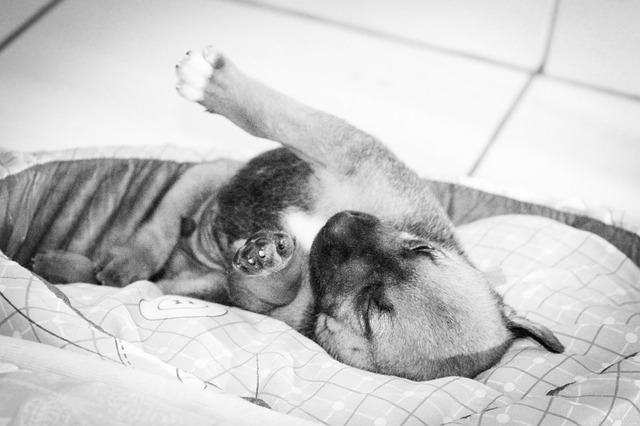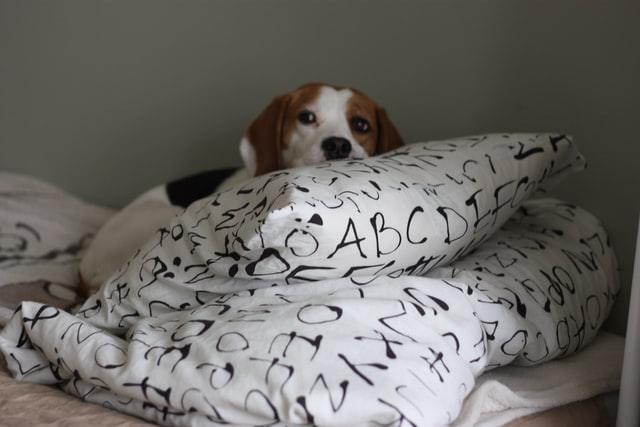Bringing home a new puppy is always an exciting moment, but once you get over the excitement you realize that adjustments have to be made for your new friend to settle down.
Sleeping arrangements are most of the time subject to debate, everyone has an opinion on the matter.
If you’re reading this article you probably do not find the idea of a crate appealing and looking for other alternatives.
A puppy sleeping without a crate is fine, as long as you provide a safe alternative, the puppy can sleep in your bedroom, a playpen is a good idea, puppy-proofing an area or a room in the house is also possible, what’s important is not to let your puppy roaming freely around the house at night.
Young puppies are curious by nature and they do not assess danger properly, that’s why no matter where your puppy sleeps it needs to be puppy-proofed.
Most experts advise that the puppy should sleep in your bedroom at least for the first few weeks, even if your puppy is sleeping without a crate.
Sleeping in your bedroom helps to comfort the puppy during these transition times, where it’s all new and scary.
How long should a puppy sleep in your room?
The transition phase should not take more than a few weeks to help the puppy feel at home and get used to his new environment.
If you do decide that your puppy will be permanently sleeping in your room, it’s totally fine as long as it does not bother you, some puppies might be restless at night and make too much noise.
If you do notice any disturbing behavior in your puppy that would make you move him out of your bedroom it’s better to do it soon preferably at the age of 3 to 4 months.
If your dog is used to sleeping in your room and has spent years there, it will be harder to move him out.
3 to 4 months is the ideal timing, the puppy is old enough to hold it a whole night without a potty trip, and he’s not too attached to your bedroom yet to make a scene when it’s time to move out.
When is the puppy ready to sleep out of the crate?
Puppies that are properly crate trained tend to build a good relationship with the crate, it represents a safe and intimate space for them.
We generally don’t recommend making the puppy sleep without a crate if he’s already crate trained and not showing any signs of rejection towards the crate.
However, if for some reason you see it fit for your dog to sleep out of the crate, then the perfect age would be around 12 months, depending on the breed it could be as early as 12 months, or as long as 18 months for mouthy and chewy breeds.
You’ll know that your puppy is ready to sleep without a crate when he’s acting responsible enough outside of his crate.
A puppy that keeps running around the room and chews on whatever is in there is definitely not ready to sleep out of the crate.
Every puppy is different, the idea is for the puppy not to be acting crazy waking you up in the middle of the night banging on furniture.
How to train a dog to sleep without a crate?
There are two situations when you need to train a dog to sleep without a crate, he’s either already crate trained and sleeping in the crate, or he’s never been into one before.
Puppy is already sleeping in a crate
It is much easier to train a dog to sleep without a crate if he’s been already sleeping in one, during that period he’s learned to stay at one place and hold his bladder for the night.
Al you have to do is break his attachment to the crate being his safe den and replace it with a playpen or a regular bed.
You have to do it gradually and start slow by opening the crate door at night and observing how your puppy reacts, generally if crate trained properly a puppy will still sleep in his crate even if it’s open.
It would be a good idea to start by installing a bed within the crate if not already here, and then moving it out of the crate to make the transition easier for your puppy.
It usually doesn’t take long for your dog to get used to the new sleeping arrangement, like we’ve explained the crate has already done the hard part for you.
Puppy is not sleeping in a crate
On the other hand, if your puppy has never been in a crate before you’ll need to make some confinement adjustments before you start training.
It is best to avoid having a new puppy sleeping in your bed, some house rules need to be set from the start.
However, younger puppies are all over the place and it takes time to establish house rules, that’s why a playpen or a puppy-proof area is a good idea.
The confinement area will provide a safe space where you can install your dog’s bed and start training.
The younger the puppy the easier it is to train him, old habits in older dogs are harder to break.
Verbal praise, chew toys and treats are always a great way to lure the puppy into his bed at night but make sure the puppy is tired and has had enough exercise before bedtime.
Physical activities make puppies more cooperative and willing to sleep, they’ve enjoyed a busy day and need to relax anyway.
Where should my dog sleep at night time?
This is one of the most common questions asked by new dog owners, most dog parents want to do right with their dogs, some are not so keen on using a crate.
However, there is no exact answer, it depends on what you believe, what makes you and your dog feel comfortable, even experts can’t seem to agree on this one.
We usually recommend using a crate, however, it’s not in the law, as long as it’s safe for your puppy there is no problem.
We strongly suggest you don’t change your dog’s sleeping area very frequently, it makes training easier and helps the puppy settle quicker, even the potty training is a lot easier.
At first, your puppy should sleep in your bedroom, then move it out of the bedroom at around three to four months of age.
If your puppy is calm and not making too much noise at night and it does not bother you, he can sleep permanently in your bedroom.
We found that the puppy should sleep in a confined area in the living room just to avoid constant changes in his sleeping habits.
Should my dog sleep in a separate room?

When you just bring the puppy home, it is more comforting for him to sleep in your bedroom and more convenient for you to potty train him.
We believe that a puppy should sleep in another room when grown enough to hold it through the night without a potty trip.
It’s not very healthy for a dog to be too attached to his owner, he becomes more exposed to separation anxiety, and it’s harder to socialize him with other pets and people.
Please note that correlation is not causation, chances are higher, but early socializing and adequate house rules can help establish a good and healthy relationship with the puppy even if he sleeps on your bed.
By closely dealing with dogs for a long time, we can safely say that they somehow are similar to kids in terms of self-reliance, a higher level of independence makes your puppy more confident and self-reliant, and sleeping in a separate room can help boost that.
Leaving the puppy downstairs at night
Leaving the puppy downstairs at night without supervision is not safe for a young puppy, until the puppy is properly house and potty trained, it’s best to prepare a confinement area.
Puppies begin teething between the ages of 4 to 6 months so the chewing gets a bit worst and leaving the puppy alone downstairs can cause some damage to your furniture.
Young puppies do need your presence in the first few months of their life to get used to the new home and the sudden change.
You will have a hard time dealing with all the whining and howling if you leave the puppy downstairs from day one.
Dogs that are mature enough and have had proper house training can be trusted to sleep safely even without a crate in any room.
Alternatives for a puppy sleeping without a crate?
A puppy sleeping without a crate is possible and plenty of dog owners don’t like/use crates, however, we strongly recommend using an alternative confinement solution.
Puppy playpen
The puppy playpen is an alternative of choice for most pet parents that don’t want to use a crate, however, it is not a crate and can’t be used for crate training
We believe foldable playpens are the best to use for puppies, you just need to make sure it’s well secured and large enough for the puppy.
The one we use and recommend is the MidWest Foldable Metal Dog Exercise Pen (check on Amazon), it can be easily installed and folded away and it’s strong enough for most puppies.
Not only can the playpen be used for sleeping it will also provide a safe environment with plenty of room to play for your puppy when unsupervised.
Dog Gates
Dog gates are also a great way to make a puppy-proof environment for your dog with plenty of space to enjoy.
You have to clear the room in which you’re using the gates from anything dangerous or precious and make a puppy-proof room.
We recommend using the Unipaws dog gates/playpen (check at Amazon), it’s a bit pricy compared to other dog gates but it can be used as both a playpen and a dog gate.
You can use it as a dog gate during the day to provide more space for your puppy to play and explore, and as a playpen at night for a more confine solution and more safety.






